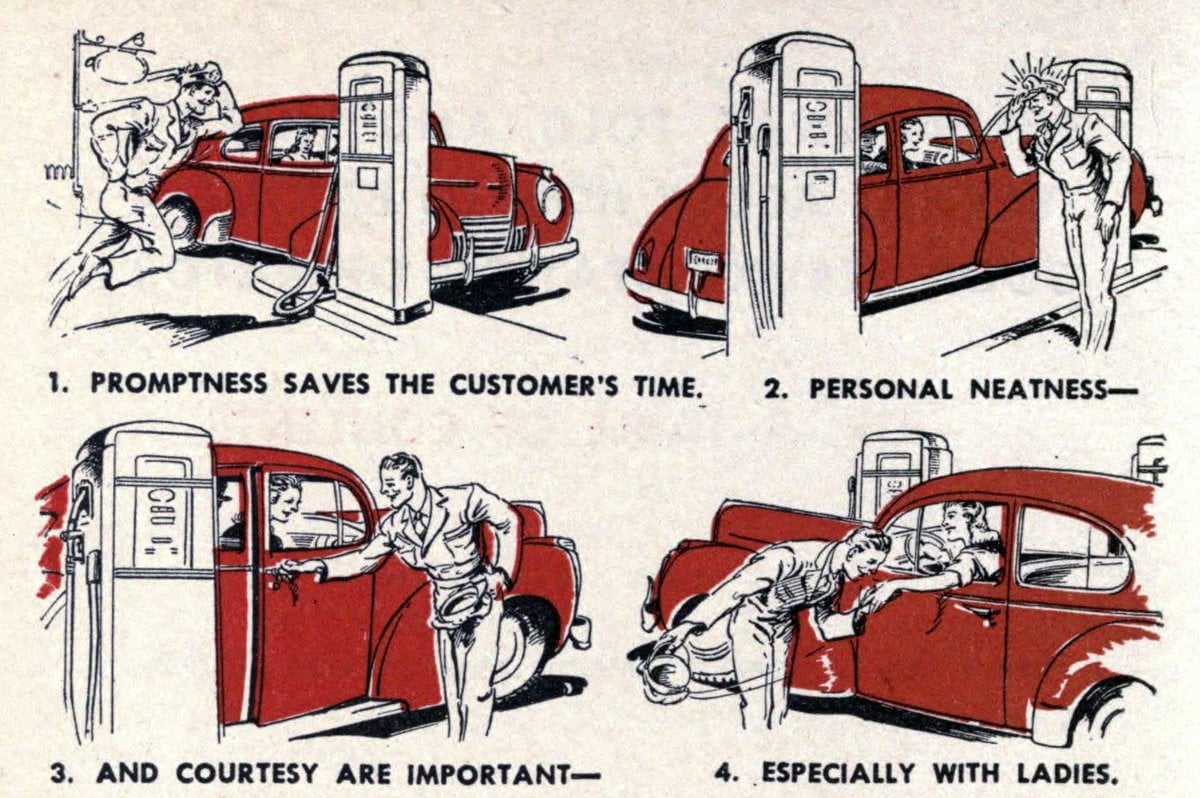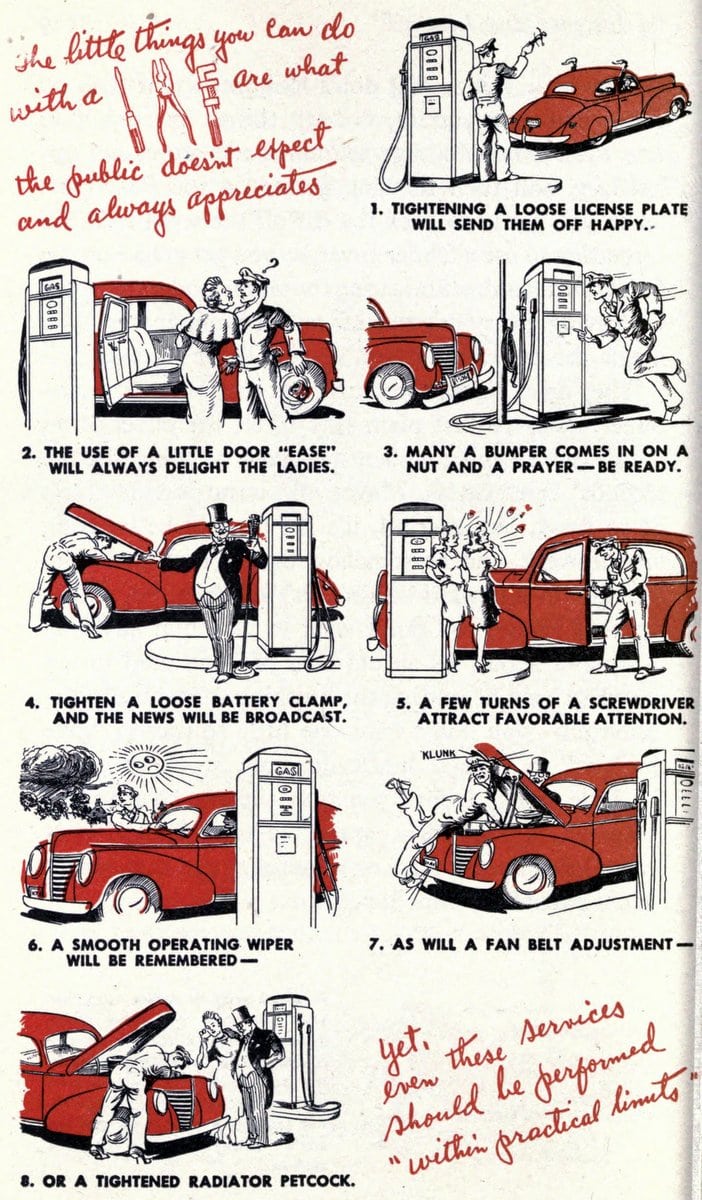
Gas station service attendants: Listen and learn
When I first started working in a service station, it seemed to me there wasn’t anything very complicated about filling gas tanks and putting in oil. I thought all the talking the boss did, and all the service manuals he gave me to read, were just trying to make a simple job sound important. But I was a polite little cuss, and didn’t want to hurt anybody’s feelings, so I listened and I read. But I didn’t take it too seriously. I listened, but I didn’t learn, because I wasn’t thinking.
After a while, I was smart enough to see that I was working harder and getting less done than some of the other fellows, so I tried another plan. I began doing exactly what I was instructed to do. The service manual said that when a customer approached, I was to hurry out to meet him, smile like I was glad to see him, lift my hat and say, “Good Morning, Sir! Shall I fill it up with Super Special?”
Well, I finally got so I could scoot up to a car without acting like I was trying to steal second base, and I managed to give prominent display to my bridgework, and acquired a chronic cold from exposing my head to the elements. But I decided I was still on the wrong track. I was listening and performing, but I still wasn’t learning.

I decided the thing to do was to just be myself — to act natural and treat customers like I’d want to be treated if I were a customer. I found I felt more at ease that way and the customers acted as if they felt more at home in my station, too.
Of course, acting natural didn’t give me the privilege, when Father Malone drove in, of yelling, “Hi, Father, how ya doin’?” even though the Father is a swell guy who wouldn’t have cared. And no customer was a “partner,” “pal,” or “brother” to me. And, though I’ve often felt like it, I never permitted myself the pleasure of whistling “Jeepers, Creepers, Where Didja Get Those Peepers?” while filling the tank for a good-looking young lady, and good-looking young ladies do drive cars.
If you want to be a success in a service station or in anything else, for that matter, you have to follow up reading and listening, with thinking and analyzing, so you can learn how to apply what the other fellow is trying to tell you to your own particular job. In other words, when I say “listen and learn,” what I really mean is “listen, think, and learn.”
– By Bill Olson, a composite of the men who continue to operate service stations at a profit, in spite of chiseling and price cutting in peacetime, and a multitude of annoyances in wartime. This book is a record of how and what he learned for the benefit of others who, like Bill himself, know how to learn by listening.
Vintage full-service gas station tips for top customer service
- Don’t be afraid to ask the customer what he wants.
- Keep an eye on the gas tank cap.
- Wipe the tail lights and rear window when passing by.
- Watch out for missing valve caps.
- And why not wipe the windshield – why not?
- Getting the hood up is always good practice – if possible.
- Check radiator water level carefully.
- Check the oil – using the dipstick.
- And don’t overlook the opportunity to sell fan belts and spark plugs.
This procedure (within practical limits) will make your work pleasant and profitable

Basic customer care increases profits
- Promptness saves the customer’s time.
- Personal neatness –
- And courtesy are important –
- especially with ladies.
- Carelessness is inexcusable.
- Knowledge of your products –
- And the customer’s car –
- Aggressively presented –
- Keep you busy –
- And increases profits.

The little things you can do
The little things you can do with [tools] are what the public doesn’t expect and always appreciates
- Tightening a loose license plate will send them off happy.
- The use of a little door “ease” will always delight the ladies.
- Many a bumper comes in on a nut and a prayer — be ready.
- Tighten a loose battery clamp, and the news will be broadcast.
- A few turns of a screwdriver attract favorable attention.
- A smooth-operating wiper will be remembered –
- As will a fan belt adjustment –
- Or a tightened radiator petcock.

The right way to work with customers
- Accessory displays have their limits –
- Even though the customer may see them –
- It’s still up to you to be alert for possible needs –
- Such as tires –
- Windshield wiper blades –
- Polish and waxes, etc.
- By using the correct approach –
- And explaining the merits of these products –
- Profitable sales should result.

Lubrication for return customers
Application is the most important thing to know about petroleum products — the where, the when and the why:
- Always consult the lubrication guide.
- It tells the grade of motor oil to use –
- And the exact crankcase capacities of all cars –
- As well as what parts to lubricate (aside from the steering wheel) –
- However, mechanical conditions alter motor oil requirements –
- As do seasonal changes in atmospheric conditions –
- But, come hail or high water, use the dip stick –
- And your customers will come right back.

More ways to run an efficient filling station
- Make it easy for Banker Snodgrass to write a check.
- Prepare the way for Mrs Van Snood – before she gets there.
- Keep tires and accessories handy, but not underfoot.
- Keep specialties at the pump island – but don’t overdo it.
- Keep the driveway clean so customers can get in.
- Wash out the lubritorium every day – regardless.
- Choose the right time to paint the place.
- Keep batter water containers filled and close at hand –
- But not too close.
“Within practical limits,” all of these things will add to efficiency, appearance and good will.




















